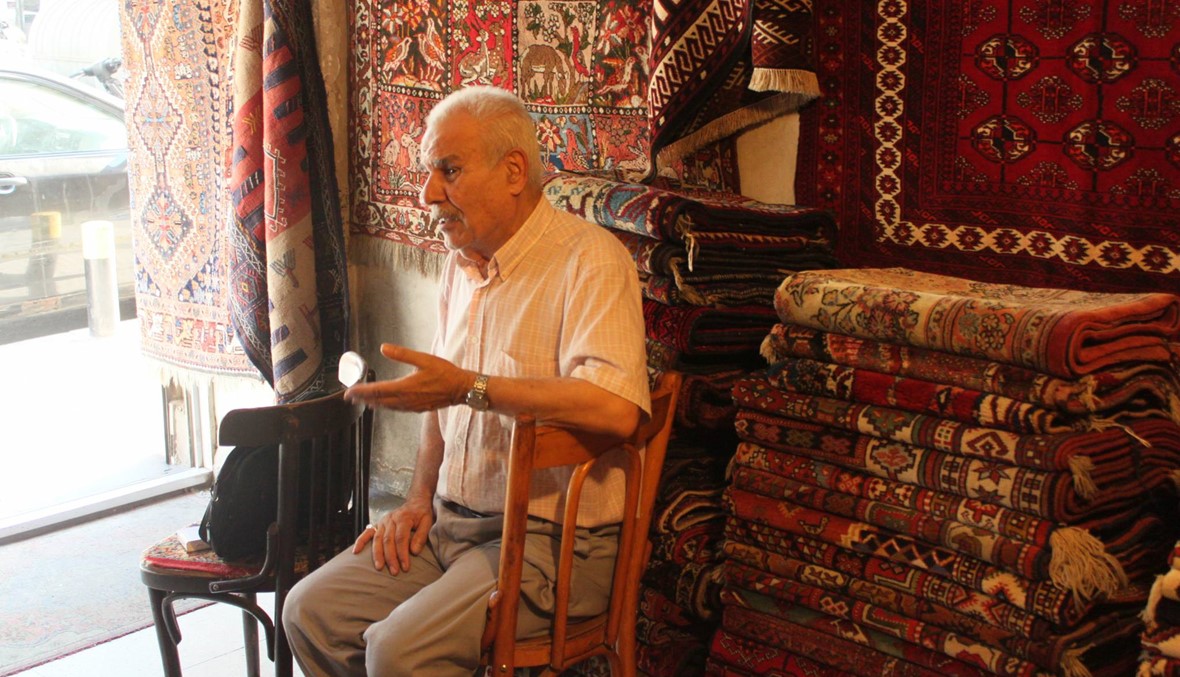

BEIRUT: The first carpet in history was made of twine, Bakri Ajaj, also known as Abo Akram, one of the oldest carpet sellers in Beirut, recites in a short history of the ancient profession of carpets and the market that it created.
Ajaj, whose family was originally from Turkish Kurdistan, was born in Beirut. His father immigrated to Lebanon in 1924.
His vibrant interest for carpets developed in the 1950s; later on, in 1974 he opened his own carpet store; the store is still open and his love of the woven art is still alive.
“It started as a passion at first,” he said.
Listening to all the stories about carpet dealers and the people’s interest in the ancient craft, gives the listener an insight about the changes this art and profession has been undergoing for years. Woven into the carpets crafted through the centuries is the tapestry of Middle East history.
A myriad of carpets ornament Abo Akram’s store in Basta, giving it a traditional and warm ambiance.
For a visitor, he spreads a collection of fine Persian carpets, pointing out the difference between each one.
"This one is from Yazd, while the other is from Kom in Iran,” he said with pride.

Uniqueness
Ajaj is disappointed because “carpets from Tehran are lost to our market”. The reason behind that, he says, is because they are the most expensive amongst other Persian carpets.
“The value of a carpet is measured in how old it is and if it’s the only unique piece found or not,” he told Annahar.
“Imagine that the only thing you’ve inherited from your great-grandfather was a 3,000-year-old carpet, would you sell it for thousands of dollars? It’s worth everything for you,” he added.
Ajaj tells Annahar a story about a wealthy man living in Zoukak el-Blatt area in Beirut, who bought a carpet made of deerskin from one of the religious areas in Syria.
“One of the biggest religious institutions in Lebanon filed a case against this man for the symbolism his carpet held,” he said, adding that “the carpet contained messages, delivered on deerskin, from Prophet Mohammad to one of the rulers back then.”

Less appreciation
Ajaj realized that the new generation holds less appreciation for carpets.
“Unfortunately, young people nowadays don't know the value of something, unlike the old generation,” he said, adding a rhetorical question, “Isn’t it weird that people enjoy having a carpet that looks like grass and sit on a carpet made of feathers?”
Throughout all these years, Ajaj witnessed the “degrading” of taste when it comes to carpets. Yet, “many people sill appreciate high-quality carpets,” he adds.
He feels a sense of sadness as the majority of carpets are now made by machines and “there is less appreciation for everything handmade.” It is not the same thing in his opinion.
“A carpet manufactured with machines and another crafted for long hours and passed from one person to another to finish it, do not have the same value,” he indicates.

European vs. Persian
Even though Persian carpets have been known to be the most valuable throughout ages, European carpets lead the market in terms of sales, according to Ajaj.
“Europeans know how to market everything, no matter how valuable it is,” Ajaj says.
“French Galene and Opaline carpets have always been very expensive, because they used to be created in a way that is a lot different than today,” Ajaj indicates.
Surprisingly, for anyone who is not a carpet expert, Turkish carpets are exceeding Persian ones, not only by sales, but by quality as well.
“Looking into a Turkish made carpet, you will find 140 stitches/centimeter,” Ajaj tells us.
He explains that “Turks use real paint derived from insects' blood or from certain plants, and they mainly use real silk in their carpet making.”

Distinct store
What makes Ajaj’s store distinct is its past and present, he says.
His love of carpets made him open his store from morning until midnight right after the civil war ended in Lebanon in 1975, and for the next three years.
“Back in 1967, 1977, and 1978, my store was almost always crowded,” he says. The carpet seller is confident that his store is distinctive among others, for the quality of carpets he sells, and for the unique pieces you won’t find anywhere else.
“Former British, French, and Swiss ambassadors only chose their carpets from my store,” he told Annahar.